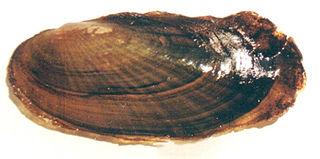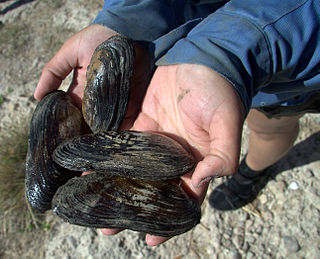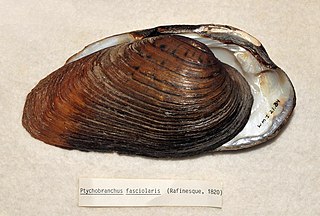The Sydenham River is a river in Chatham-Kent, Lambton County and Middlesex County in southwestern Ontario, Canada, flowing southwest from its source west of London, Ontario and emptying into Lake Saint Clair. The length of the river is 165 kilometres (103 mi) and it drains a watershed of approximately 2,700 square kilometres (1,000 sq mi). The river flows through the towns of Strathroy and Wallaceburg. It was named after Lord Sydenham, governor of Canada from 1839 to 1841.

The dwarf wedgemussel is an endangered species of freshwater mussel, an aquatic bivalve mollusk in the family Unionidae, the river mussels.

The Unionidae are a family of freshwater mussels, the largest in the order Unionida, the bivalve molluscs sometimes known as river mussels, or simply as unionids.

The common logperch, sometimes simply known as the logperch, is a species of freshwater ray-finned fish, a darter from the subfamily Etheostomatinae, part of the family Percidae, which also contains the perches, ruffes and pikeperches. Like other logperches, it has the typical vertical barring along the flank and a subterminal mouth.
Alasmidonta atropurpurea, common name Cumberland elktoe, is a species of freshwater mussel, an aquatic bivalve mollusk in the family Unionidae, the river mussels.

Unionida is a monophyletic order of freshwater mussels, aquatic bivalve molluscs. The order includes most of the larger freshwater mussels, including the freshwater pearl mussels. The most common families are the Unionidae and the Margaritiferidae. All have in common a larval stage that is temporarily parasitic on fish, nacreous shells, high in organic matter, that may crack upon drying out, and siphons too short to permit the animal to live deeply buried in sediment.

Epioblasma is a genus of freshwater mussels, aquatic bivalve mollusks in the family Unionidae, the river mussels. Most of the species in this genus have been lost in modern times, and the entire genus is threatened with the possibility of extinction.

The Cumberlandian Combshell is a species of freshwater mussel, an aquatic bivalve mollusk in the family Unionidae. This species is endemic to the United States, found mainly in the states of Tennessee and Virginia. This mussel resides in medium-sized streams to large rivers. The combshell is an endangered species and protected under the Endangered Species Act of 1973. The combshell is threatened by habitat modifications and pollution.

The oyster mussel is a rare species of freshwater mussel in the family Unionidae. This aquatic bivalve mollusk is native to the Cumberland and Tennessee River systems of Kentucky, Tennessee, Alabama, and Virginia in the United States. It has been extirpated from the states of Georgia and North Carolina. It is a federally listed endangered species of the United States.
The upland combshell was a species of freshwater mussel in the family Unionidae. It was endemic to the upper Mobile River Basin in the southeastern United States.

Epioblasma turgidula, the turgid blossom pearly mussel, turgid riffle shell, turgid-blossom naiad or turgid blossom, was a species of freshwater mussel, a mollusk in the family Unionidae. It is now extinct.

Leptodea leptodon, the scaleshell mussel or scale shell, is a species of freshwater mussel in the family Unionidae, the river mussels. This aquatic bivalve mollusk has disappeared from much of its historical range. It is endemic to the United States, where it is now present in four or fewer states; it is only found with any regularity in Missouri. It is a federally listed endangered species of the United States.

Obovaria retusa is a rare species of freshwater mussel in the family Unionidae, the river mussels. Its common names include golf stick pearly mussel

Pleurobema oviforme, the Tennessee clubshell, is a species of freshwater mussel in the family Unionidae, the river mussels. It is native to the eastern United States, where it occurs in Alabama, Kentucky, North Carolina, Tennessee, and Virginia. It also previously occurred in Mississippi.

Popenaias popeii, common name the Texas hornshell, is a species of freshwater mussel, an aquatic bivalve mollusk in the family Unionidae, the river mussels.

Ptychobranchus fasciolaris is a species of freshwater mussel in the family Unionidae, the river mussels. Its common name is kidneyshell.

Epioblasma walkeri, common name the tan riffleshell, is a species of freshwater mussel, an aquatic bivalve mollusk in the family Unionidae, the river mussels.

Epioblasma torulosa, commonly called the tubercled blossom, is a species of freshwater mussel, a mollusk in the family Unionidae. It is native to eastern North America, where it is considered endangered in both Canada and the United States.

Strophitus undulatus is a species of mussel in the Unionidae, the river mussels. It is native to eastern Canada and the eastern United States. Its common names include creeper, squawfoot, sloughfoot, and strange floater.

Epioblasma obliquata, commonly called the catspaw, is a species of freshwater mussel. It is native to eastern North America, where it is classified as endangered under the Endangered Species Act.


















